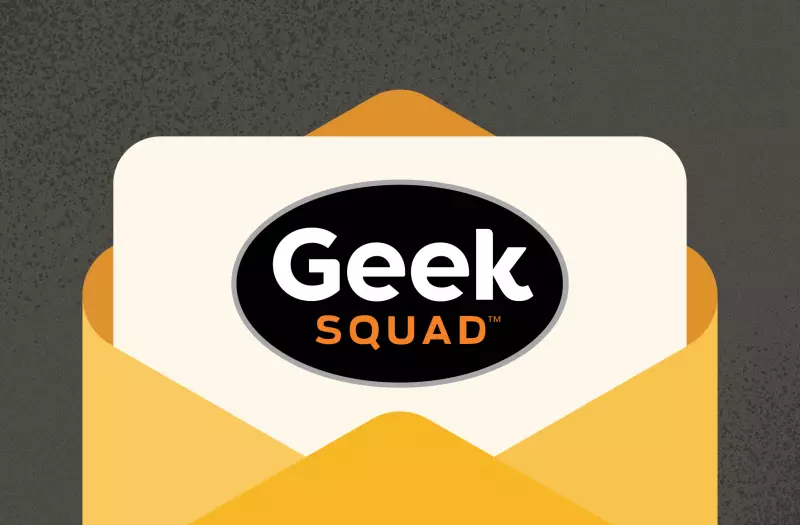What is the Geek Squad Email Scam and How to Avoid It
- By Brianne Savage
- Published: Sep 26, 2022
- Last Updated: Sep 27, 2022

Computers are, arguably, one of the most essential items necessary for life in modernity. Through them, not only can we be entertained, but we can be informed or critiqued. We can suffer the internet’s favor as much as incite its wrath. Despite computers’ usefulness and abilities, laypeople don’t always need to know how to repair their toys.
It’s easy to find someone to fix your computer; it’s just a Google search away, after all. But many people have found an even easier solution: take the problem computer back to where they bought it. For most, this means visiting the store with the big yellow tag: Best Buy.
Best Buy itself doesn’t complete any form of computer repair—they are salespeople. Thus, when consumers enter with malfunctioning tech, they are often redirected to Best Buy’s in-house subsidiary: Geek Squad. Over 32,000 Geek Squad agents across the United States serve millions of customers every year.
How can they serve so many people at once? Well, by using more technology! Geek Squad will email their clients updates and news as their device is being maintained. Then, after the tech is collected, those emails continue—partially as a helping hand but also as a marketing technique.
What is the Geek Squad Email Scam?
Geek Squad’s emails are a well-known vehicle for email scams. Their emails are simple and easily replicated, ripping official logos and jargon straight from the real ones. Often, a Geek Squad scam email will put the user under pressure to respond to the email directly. The emails induce panic in the user, which will often cause clouded judgment. Some of the information these emails include can be:
Subscription Renewal Services
Geek Squad recently announced an optional subscription-based service, and over two million people have signed up with it. However, these scams are banking on the idea that the end user is either (1) part of that subscription plan or (2) they don’t want to be, and they were “mistakenly” signed up for it.
In the case of the first, many might ignore the email, but in the latter—the user may panic. This panic is reinforced when they call Geek Squad and ask questions. The scammer may ask to take an 'exit payment' to leave the subscription plan early—similar to the exit costs in a contract.
Order Collection Services
These scams work by guessing that the user has used Geek Squad in the past. Anyone who has worked in a repair shop knows that sometimes people forget to pick up their stuff; these scammers take advantage of this unfortunate habit.
Usually, the email will be vague, causing just enough doubt in the user to incite panic. When the user calls to verify the thing they “left,” the scammer will insist on payment over the phone. Scam victims usually pay the cost then and there to make the pickup process “more straightforward” and fast.
The Scammer Phone Number
There’s another, more insidious issue with these scam emails; the phone number attached to them is not the actual support number. If the scam email is ignored, they could call the scam number when they eventually have issues with their tech.
This is one of the more unfortunate ways scams can become lucrative since many people like to pay for services beforehand. Moreover, some scammers will assist with fixes before playing a long-con for considerable money.
Emails Aren’t the Only Scams Used Either
A Geek Squad scam doesn’t have to be in the form of an email. It can also come in the form of a Geek Squad scam text. These texts operate the same way an email scam works—only it’s over our beloved cell phones.
These text scams are potentially more dangerous too. Everyone knows they should be cautious when checking their email—but being cautious when texting is still slightly new. Now, we can click on a link embedded in our texts and become engrossed in scams, as easy as that.
Further, users can click on the sending phone number and immediately speak with a scammer pretending to be Geek Squad. Talking is one of the fastest ways to get scammed—it’s easy for scammers to build a report by speaking. This means do not ever get on the phone with a scammer.
How to Avoid a Geek Squad Best Buy Scam
Signs to Watch for in Text or Emails
There are many excellent ways to figure out if the email or text in your Inbox is a scam. Telltale signs that a scammer has contacted you and is not the real deal can include signs like:
- Spelling or grammar errors
- No direct identifications (i.e., using Sir or Madam over your name)
- Different transaction currency (i.e., rupee versus the dollar)
- Call to immediate action or face consequences
- If the email has the official logos but poor communication elements
Check with Geek Squad Customer Support at 1-800-433-5778
If the above signs aren’t enough or aren’t there, but you still are unsure, call Geek Squad. Don’t trust any emails or texts that contain a phone number—they can be tricks. What’s worse is that it is possible to set up a fake number and create a masked link. This means that a scammer can put the Geek Squad customer support number as a link—but when you click on it, have it route to another number.
How can we get away from this? It’s simple; just call them yourself. Don’t click on any link in any email that is even remotely questionable. Further, if needing services, choose to meet in person. A Geek Squad appointment is the best way to ensure everything is correct with your orders.
Block the Scammers as Soon as You Notice Them
Those who know scammers are targeting them would do well to block them. All email platforms and cellphones offer options for stopping incoming communications, so take advantage of this ability. And if you are scammed, take it to the authorities, there is no shame in a lapse of judgment, but there is shame in letting it happen to others.

















